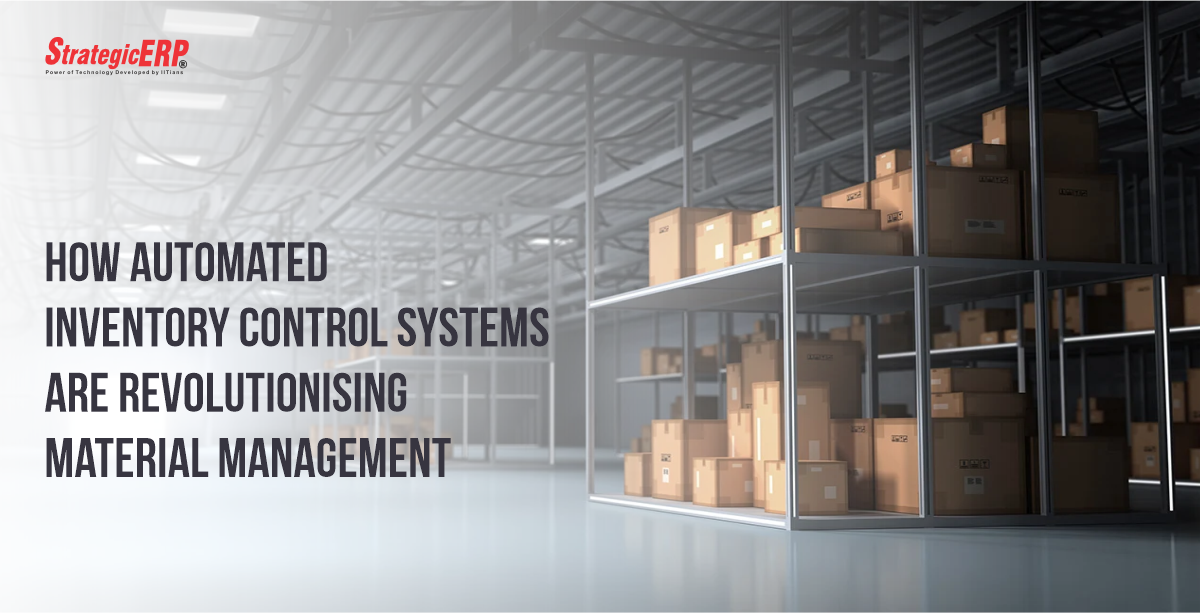How Automated Inventory Control Systems Are Revolutionising Material Management
Category : Digital Transformation
Blog posted by : Admin / 21 Dec, 2024
Managing materials is not a choice but a must for today's fast-moving industries. Automated inventory control systems have emerged as a transmogrifying tool that smoothens processes, reduces cost, and drives accuracy in operations. These advanced systems, often integrated with technologies like IoT, are enabling businesses to optimize their material management strategies effectively.
What Is an Automated Inventory Control System?
An automated inventory control system leverages technology to monitor, manage, and maintain stock levels without manual intervention. These systems make use of software solutions, sensors, and data analytics to give real-time insights into the levels of inventory, track the movement of stock, and automate tasks such as reordering. This way, organizations can enhance their operational efficiency significantly.
Importance of Automation in Material Management
Material management is one of the most important factors that allow for smooth operations in all industries. Automation brings the following advantages:
-
Minimized errors: Automated systems reduce manual errors in stock tracking and order processing.
-
Enhanced visibility: Real-time data ensures better inventory decisions and control.
-
Reduction in Costs: By optimizing stock levels, companies can lower carrying costs and avoid overstocking or stockouts.
Inventory management software by StrategicERP exemplifies how advanced automation can enhance material management, offering tailored solutions for diverse industries.
Key Features of Automated Inventory Control Systems
Image Source: Rapidops
Real-Time Inventory Tracking
IoT sensors and cloud-based software track inventory levels in real-time for automated systems. This ensures that businesses are always aware of stock availability, thereby preventing delays or disruptions.
Automated Reordering
Pre-defined thresholds ensure that the system automatically generates purchase orders in order to maintain stock levels without manual intervention. With this, you can discard stockouts and overstocking scenarios.
Data Analytics and Reporting
Data analytics capabilities embedded in the inventory systems enable businesses to track trends, forecast demand, and provide actionable insights for strategic planning.
Integration with Other Systems
The automated inventory control system is designed to seamlessly integrate with other enterprise solutions, such as project portfolio management tools and the best Infrastructure ERP systems. This holistic approach will improve the operational efficiency of any business.
The Benefits of Automated Inventory Control in Material Management
Improved Accuracy in Stock Levels
By eliminating manual tracking, automated systems improve inventory accuracy by 25-35%, as highlighted in studies shared by Research Gate.
Reduced Human Errors
Automation minimizes the scope of human errors, such as data entry mistakes, leading to more reliable operations.
Enhanced Decision-Making
Real-time data and analytics empower managers to make informed decisions about inventory levels, supplier relationships, and procurement strategies.
Cost Efficiency and Waste Reduction
Image source: GoCodes
By optimizing stock levels, businesses can reduce carrying costs by 20-30% and lower waste from obsolete or excess inventory.
Better Supplier Relationships
Automated reordering ensures timely procurement, strengthens supplier relationships, and ensures consistency in the supply chain.
Impact on Various Industries
Manufacturing
In manufacturing, inventory management systems ensure that raw materials are readily available, which in turn reduces downtime and maintains the efficiency of production.
Retail
Automated stock levels across multiple locations give retailers an idea of availability and improve customer satisfaction.
Healthcare
Hospitals and clinics rely on inventory management systems to track medical supplies, reducing waste and ensuring critical items are always in stock.
Logistics and Supply Chain
Logistics firms use automated inventory control systems to streamline operations, optimize warehouse management, and enhance delivery efficiency.
StrategicERP’s construction ERP software demo showcases how such systems can be customized to meet industry-specific requirements, mainly in construction and infrastructure.
Overcoming Challenges with Automated Inventory Systems
Implementation Challenges
The adoption of automated inventory systems requires careful planning, including the selection of the right software and compatibility with existing systems.
Training and Adaptation
Employees need to be trained to use new systems effectively. StrategicERP offers comprehensive training modules to ensure seamless adoption.
System Maintenance and Upgrades
Regular maintenance and periodic updates are performed to make the system run smoothly according to changed business needs.
Conclusion
Automated inventory control systems are revolutionizing material management. With accuracy streamlined, costs reduced, and efficiency increased, automated inventory control systems are forcing innovation across manufacturing, retail, to healthcare. The best ways businesses can ensure they end up gaining that competitive advantage are through advanced automation and integration capabilities using solutions such as StrategicERP's inventory management software.
Embracing these technologies is no longer optional but a strategic imperative for sustainable growth.
Frequently Asked Questions (FAQs)
What is an automated inventory control system?
An automated inventory control system is a technology-driven solution that monitors, tracks and manages inventory levels without manual intervention.
How does automation improve material management?
Automation reduces errors, enhances visibility, and optimizes stock levels, leading to cost savings and improved operational efficiency.
Which industries benefit most from inventory management systems?
Industries such as manufacturing, retail, healthcare, and logistics benefit significantly from automated inventory systems.
What are the key features of inventory management software?
Key features include real-time tracking, automated reordering, data analytics, and integration with other enterprise systems.
How does StrategicERP support material management?
StrategicERP offers advanced inventory software tailored to meet the unique needs of various industries, enhancing efficiency and accuracy.








